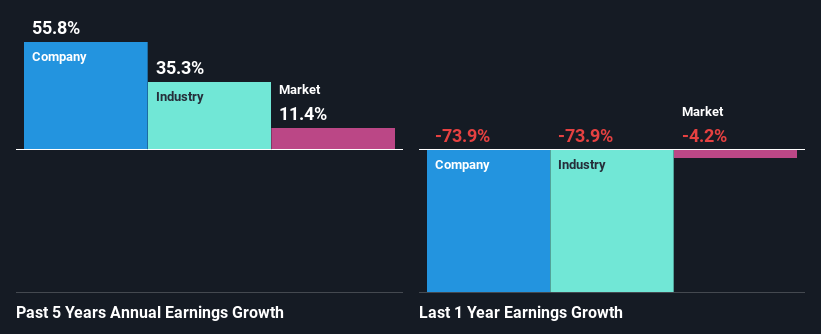Eneco Energy Limited's (SGX:R14) Stock Has Shown Weakness Lately But Financial Prospects Look Decent: Is The Market Wrong?

It is hard to get excited after looking at Eneco Energy's (SGX:R14) recent performance, when its stock has declined 43% over the past three months. However, stock prices are usually driven by a company’s financials over the long term, which in this case look pretty respectable. In this article, we decided to focus on Eneco Energy's ROE.
Return on equity or ROE is a key measure used to assess how efficiently a company's management is utilizing the company's capital. Simply put, it is used to assess the profitability of a company in relation to its equity capital.
Check out our latest analysis for Eneco Energy
How Is ROE Calculated?
Return on equity can be calculated by using the formula:
Return on Equity = Net Profit (from continuing operations) ÷ Shareholders' Equity
So, based on the above formula, the ROE for Eneco Energy is:
0.9% = S$173k ÷ S$20m (Based on the trailing twelve months to June 2023).
The 'return' is the income the business earned over the last year. That means that for every SGD1 worth of shareholders' equity, the company generated SGD0.01 in profit.
What Is The Relationship Between ROE And Earnings Growth?
Thus far, we have learned that ROE measures how efficiently a company is generating its profits. Based on how much of its profits the company chooses to reinvest or "retain", we are then able to evaluate a company's future ability to generate profits. Assuming everything else remains unchanged, the higher the ROE and profit retention, the higher the growth rate of a company compared to companies that don't necessarily bear these characteristics.
Eneco Energy's Earnings Growth And 0.9% ROE
As you can see, Eneco Energy's ROE looks pretty weak. Even compared to the average industry ROE of 1.3%, the company's ROE is quite dismal. Despite this, surprisingly, Eneco Energy saw an exceptional 56% net income growth over the past five years. We believe that there might be other aspects that are positively influencing the company's earnings growth. Such as - high earnings retention or an efficient management in place.
As a next step, we compared Eneco Energy's net income growth with the industry, and pleasingly, we found that the growth seen by the company is higher than the average industry growth of 35%.

Earnings growth is a huge factor in stock valuation. It’s important for an investor to know whether the market has priced in the company's expected earnings growth (or decline). Doing so will help them establish if the stock's future looks promising or ominous. Is Eneco Energy fairly valued compared to other companies? These 3 valuation measures might help you decide.
Is Eneco Energy Efficiently Re-investing Its Profits?
Given that Eneco Energy doesn't pay any dividend to its shareholders, we infer that the company has been reinvesting all of its profits to grow its business.
Summary
In total, it does look like Eneco Energy has some positive aspects to its business. Even in spite of the low rate of return, the company has posted impressive earnings growth as a result of reinvesting heavily into its business. While we won't completely dismiss the company, what we would do, is try to ascertain how risky the business is to make a more informed decision around the company. You can see the 4 risks we have identified for Eneco Energy by visiting our risks dashboard for free on our platform here.
Valuation is complex, but we're here to simplify it.
Discover if Eneco Energy might be undervalued or overvalued with our detailed analysis, featuring fair value estimates, potential risks, dividends, insider trades, and its financial condition.
Access Free AnalysisHave feedback on this article? Concerned about the content? Get in touch with us directly. Alternatively, email editorial-team (at) simplywallst.com.
This article by Simply Wall St is general in nature. We provide commentary based on historical data and analyst forecasts only using an unbiased methodology and our articles are not intended to be financial advice. It does not constitute a recommendation to buy or sell any stock, and does not take account of your objectives, or your financial situation. We aim to bring you long-term focused analysis driven by fundamental data. Note that our analysis may not factor in the latest price-sensitive company announcements or qualitative material. Simply Wall St has no position in any stocks mentioned.
About SGX:R14
Eneco Energy
An investment holding company, provides logistics services in Singapore.
Flawless balance sheet and fair value.

